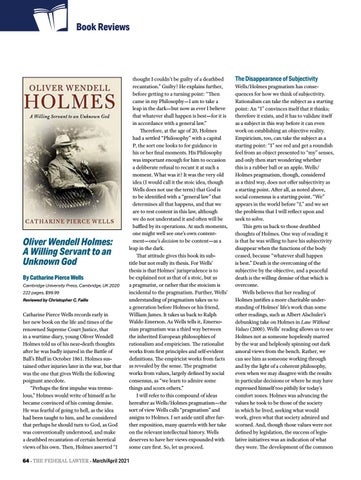Book Reviews
Oliver Wendell Holmes: A Willing Servant to an Unknown God By Catharine Pierce Wells Cambridge University Press, Cambridge, UK 2020 222 pages, $99.99
Reviewed by Christopher C. Faille
Catharine Pierce Wells records early in her new book on the life and times of the renowned Supreme Court Justice, that in a wartime diary, young Oliver Wendell Holmes told us of his near-death thoughts after he was badly injured in the Battle of Ball’s Bluff in October 1861. Holmes sustained other injuries later in the war, but that was the one that gives Wells the following poignant anecdote. “Perhaps the first impulse was tremulous,” Holmes would write of himself as he became convinced of his coming demise. He was fearful of going to hell, as the idea had been taught to him, and he considered that perhaps he should turn to God, as God was conventionally understood, and make a deathbed recantation of certain heretical views of his own. Then, Holmes asserted “I
thought I couldn’t be guilty of a deathbed recantation.” Guilty? He explains further, before getting to a turning point: “Then came in my Philosophy—I am to take a leap in the dark—but now as ever I believe that whatever shall happen is best—for it is in accordance with a general law.” Therefore, at the age of 20, Holmes had a settled “Philosophy” with a capital P, the sort one looks to for guidance in his or her final moments. His Philosophy was important enough for him to occasion a deliberate refusal to recant it at such a moment. What was it? It was the very old idea (I would call it the stoic idea, though Wells does not use the term) that God is to be identified with a “general law” that determines all that happens, and that we are to rest content in this law, although we do not understand it and often will be baffled by its operations. At such moments, one might well see one’s own contentment—one’s decision to be content—as a leap in the dark. That attitude gives this book its subtitle but not really its thesis. For Wells’ thesis is that Holmes’ jurisprudence is to be explained not as that of a stoic, but as a pragmatist, or rather that the stoicism is incidental to the pragmatism. Further, Wells’ understanding of pragmatism takes us to a generation before Holmes or his friend, William James. It takes us back to Ralph Waldo Emerson. As Wells tells it, Emersonian pragmatism was a third way between the inherited European philosophies of rationalism and empiricism. The rationalist works from first principles and self-evident definitions. The empiricist works from facts as revealed by the sense. The pragmatist works from values, largely defined by social consensus, as “we learn to admire some things and scorn others.” I will refer to this compound of ideas hereafter as Wells/Holmes pragmatism—the sort of view Wells calls “pragmatism” and assigns to Holmes. I set aside until after further exposition, many quarrels with her take on the relevant intellectual history. Wells deserves to have her views expounded with some care first. So, let us proceed.
64 • THE FEDERAL LAWYER • March/April 2021
The Disappearance of Subjectivity Wells/Holmes pragmatism has consequences for how we think of subjectivity. Rationalism can take the subject as a starting point: An “I” convinces itself that it thinks; therefore it exists, and it has to validate itself as a subject in this way before it can even work on establishing an objective reality. Empiricism, too, can take the subject as a starting point: “I” see red and get a roundish feel from an object presented to “my” senses, and only then start wondering whether this is a rubber ball or an apple. Wells/ Holmes pragmatism, though, considered as a third way, does not offer subjectivity as a starting point. After all, as noted above, social consensus is a starting point. “We” appears in the world before “I,” and we set the problems that I will reflect upon and seek to solve. This gets us back to those deathbed thoughts of Holmes. One way of reading it is that he was willing to have his subjectivity disappear when the functions of the body ceased, because “whatever shall happen is best.” Death is the overcoming of the subjective by the objective, and a peaceful death is the willing demise of that which is overcome. Wells believes that her reading of Holmes justifies a more charitable understanding of Holmes’ life’s work than some other readings, such as Albert Alschuler’s debunking take on Holmes in Law Without Values (2000). Wells’ reading allows us to see Holmes not as someone hopelessly marred by the war and helplessly spinning out dark amoral views from the bench. Rather, we can see him as someone working through and by the light of a coherent philosophy, even when we may disagree with the results in particular decisions or where he may have expressed himself too pithily for today’s comfort zones. Holmes was advancing the values he took to be those of the society in which he lived, seeking what would work, given what that society admired and scorned. And, though those values were not defined by legislation, the success of legislative initiatives was an indication of what they were. The development of the common




